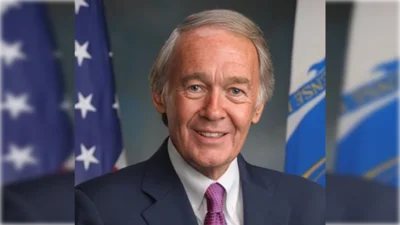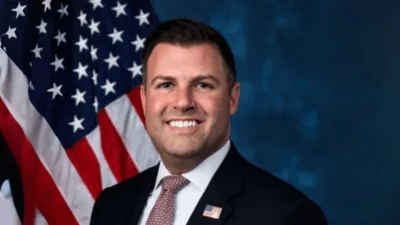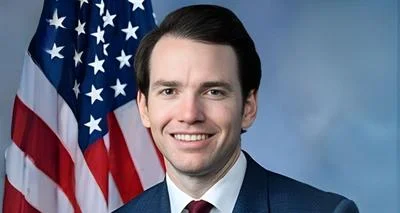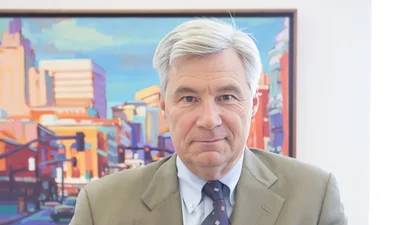Thank you so much, thank you Margaret for demonstrating the civic leadership that is so important to couple with elected leadership in order to get big things done.
I want to acknowledge and thank Representative Neguse, Senator Hickenlooper, and Senator Bennet. First of all just to address the news of the day, I want to associate myself with their remarks and with the President’s determination to respond to the unprovoked attack from Russia. From a DOT perspective, this means that the FAA in particular will be closely monitoring the situation and acting to ensure that U.S. carriers are safe and get notices to air mission for any relevant or impacted parts of the Ukrainian, Belarusian, and Russian airspace.
I also want to thank and acknowledge Representative Neguse, and Senator Hickenlooper, and Senator Bennet for their support for this bipartisan infrastructure bill. It is not an exaggeration to say that their support for this historic, landmark legislation will directly lead to improvements in the daily commutes, the everyday life, the job opportunities, and the bank accounts of every Coloradan.
And that’s part of why we’re here: to point out exactly what President Biden’s vision for building a better America looks like – and to do it in partnership with our friends in state leadership. Director Lew who has distinguished herself and CDOT as a leading agency in implementing forward-looking transportation policy; and the Governor who has a lot to be proud of, including the fact that before we got to have the President sign the federal bipartisan infrastructure law, he and his colleagues had already delivered one here for the state. And for anyone who gets the wrong idea and thinks, oh gosh, why did we do that at the state level if it’s coming at the federal level? I want to be clear, that kind of leadership and commitment at the state level means that states like Colorado are especially well-positioned to hit the ground running and take advantage of the federal legislation and the federal funding that is coming your way.
Here at Floyd Hill, we’re looking forward to the improvements to outdated infrastructure, that are going to reduce congestion for residents, have those quality of life impacts that the Senator and others were talking about, increase safety, improve travel options – but I also want to put an exclamation point on just how much this is a supply chain issue, too.
This is part of what America’s supply chains look like, and when trucks are backed up or unable to get to where they need to go in a timely fashion, that is something you will see in shipping times and in prices at the store – even if you don’t yourself traverse this I-70 corridor, even if you don’t drive.
Right now we’ve got an unprecedented level of demand for goods – that is a sign of economic recovery – but we’re pushing those goods across infrastructure that was built generations ago. And then that challenge has been compounded by what has happened with the pandemic.
As complex as the causes of these supply chain disruptions are, the impact is very simple, which is that Americans are waiting longer and paying more for goods that they need.
And that is one of the reasons why we have such a sense of urgency about deploying these infrastructure resources.
I also want to mention that today, we are releasing the Administration’s report, as we were tasked to do one year ago with a one-year clock by President Biden, on supply chain disruption.
It reflects the work that we’ve done in every part of the country, from working with the Ports of LA and [Long Beach] on their expansion to 24/7 operations, to nationwide work to strengthen the trucking workforce, to funds to set up inland pop-up temporary container yards in places like Savannah.
We launched, last month, the largest dedicated highway bridge investment [since the Interstate Highway System], that I think is going to be again important not just for convenience and commutes but for the supply chains of our country.
Yesterday, we announced applications for $450 million, the largest federal investment ever in the Port Infrastructure Development Program.
And today we’re putting forward over 60 actions recommended in our report and strategy that are going to help us address the supply chain concerns that we have both in the near term and for the long run.
This is also a place where we can’t help but talk about climate change, knowing that transportation is the single-largest contributor of greenhouse gases in the U.S. economy – one of many reasons why we need to make sure transportation is a big part of the solution.
Tomorrow I’ll be visiting another of the most vulnerable parts of I-70 in the country, in Glenwood Canyon.
The mudslides that occurred there last summer, triggered by wildfires, caused enormous destruction to property and to life and to our supply chains, forcing truck drivers to have decide between 3-hour detours or being stuck.
So I want to emphasize right now the opportunity in front of us, the challenge in front of us, and the partnership behind us, literally, that is going to allow us to make this a historic season, one like nothing we have seen in our adult lifetimes, and one that I think will be remembered for many decades to come.
But again let me hand it to Governor Polis, whose Administration has been doing such good work and who we are looking forward to working with closely on everything from supply chain enhancements to electric vehicle charging stations to the improvements that we’re featuring right here on I-70.









